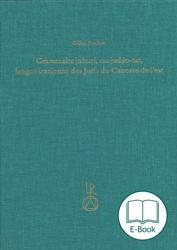Juhuri (Judeo-Tat), the language of the so-called “Mountain Jews” of Daghestan and Azerbaijan, belongs to the Caucasian Tat group of South-Western Iranian. Its Iranian heritage, reflected by noteworthy archaisms, constitutes an important component of the language, but Juhuri has also been under the influence of Turkic and indigenous Caucasian languages since it arrived in the Caucasus more than a millenium ago. Owing to its unique history as the language of an Iranian Jewish community in the Caucasus, Juhuri exhibits many unusual and typologically rather remarkable characteristics.
The book, based on written sources complemented by the author's fieldwork, offers a comprehensive description of the language, each feature illustrated by numerous example sentences, and concludes with sample texts and a full glossary.
„Nevertheless, all in all, this rich grammar of Judeo-Tat serves as a welcome tool in future studies of a language that has not received sufficient scholarly attention. By utilizing asound methodology to process a wealth of linguistic material, Authier has succeeded in offering new insights into various topies of morphosyntax of the language“
Von Habib Borjian
In: JAOS, 135, 3, S. 623-625.
The series Beiträge zur Iranistik was founded in the 1960s by Georges Redard and subsequently edited by Nicholas Sims-Williams from 1997 to 2020; the present series editor is Agnes Korn.
The series publishes works on the languages of the Iranian branch of Indo-European. The focus is on linguistics, including grammars, dictionaries, text editions, philology as well as diachronic and synchronic studies of linguistic topics. Neighbouring fields such as literature, archaeology and anthropology are likewise represented. The languages of the series are English, German and French. The Beiträge zur Iranistik are represented in libraries internationally and are widely used standard works of Iranian studies.
Gilles Authier
né en 1967 à Paris, est chercheur et maître de conférences, habilité à diriger les recherches, à l’Institut National des Langues et Civilisation Orientales de Paris (INALCO). Il est spécialiste des langues du Caucase de l’est (Azerbaïdjan et Daghestan), qu’elles soient indigènes ou turciques et iraniennes, et de la grammaire comparée des langues caucasiques de l’est. Son approche, prenant appui sur la typologie générale des langues est essentiellement descriptive, sous forme de grammaires complètes de langues jusqu’à présent très peu documentées ou décrites.


 Leseprobe
Leseprobe